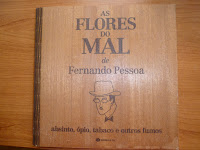My husband and I returned Sunday from a five-day trip to Braga, Portugal. We went for the Braga Romana Festival, which I'll be posting about soon, with pictures. Here is a little "taster" until then. But today our last evening in Braga is fresh in my mind, because friends we've been privileged to know — Carla Pereira, her husband, Armando Coelho, and their daughter, Beatriz — made it magical.
To begin with, I am a fan of Pessoa, the mysterious Portuguese poet whose poems were never discovered until after his death. He's considered one of the greatest poets of the 20th Century, and one of Portugal's two greatest poets. The fact that I'm a fan doesn't mean I've read a lot of his work: But I do have two books of his translated poems that I dip into from time to time. And when I do, there is something about his use of words, even translated, that etch the heart and linger on.
So the evening we were to go out to dinner, Carla invited us to their flat for snacks first, and gave us this marvelous present: A hand-crafted book of some of his poems. You can see what a marvel the book is: The cover is wood, as it the spine, all lovingly assembled into a masterpiece of workmanship. The poems are in Portuguese, alas, but I will make it my Portuguese language lesson to start translating them one by one — probably for the next 30 years! 😊 She also gave us a bottle of Dona Carla wine, which we are saving for a special occasion. (Maybe when my new book comes out in October)
Those were the first two surprises.
The third surprise was where we went for dinner — a small fishing village about 32 kilometers away from Braga. It's called Apúlia, which is also the name of a town in Italy, and it is thought that perhaps there is a connection, due to Roman-style original folk costumes that may go back to the Roman Empire. The name of the restaurant was A Cabana (The Beach Hut). More about that later, but first we walked along the beach, enjoying the fresh breeze, the susurro of waves, the peacefulness that always comes near the ocean.
 |
 |
 |
 |
Before we got back in the car to go to A Cabana, we posed for two group photos. And then we went on to the restaurant which was another great experience.
 |
 |
Finally, it was time to go. But the evening wasn't over! You might call this surprise #4: Armando drove us from beach area to beach area as twilight fell. It was a beautiful night. The sky was that lovely blue that always seems so mystical. The moon wasn't visible from inside the car, but Venus was — a planet, but also known as the evening star and the morning star, and always shining brightly. That's the epitome of Portugal for me: always shining brightly.
How about you? What is the most magical trip you can remember? What is the most magical evening? Does twilight affect you? Do you love to wander along the beach?














.jpg)
